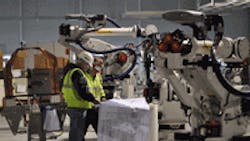Walk down any street in downtown Chattanooga and the reminders of its glorious past are unmistakable: through photographs or murals on buildings bear images of 19th century factories belching out smoke. Manufacturing, as its mayor likes to remind listeners, is in this city's DNA.
But Chattanooga, like most cities throughout the U.S., has had to rethink how to cultivate an industry which has shrunk dramatically in recent decades. Indeed, the city in many ways had to rethink its own identity in the process.
What has emerged though is a dynamic manufacturing community that instead of losing industrial jobs is noticeably adding them. German automaker Volkswagen, for instance, is in the process of completing a 2-billion-square-foot, $1 billion plant to produce an as-yet unnamed sedan to replace the Passat. The facility will employ 2,000 manufacturing workers, with production set to begin at the start of 2011.
Just as significantly, Alstom, a French power plant builder, is opening a manufacturing facility to produce new turbines for the nuclear industry. The $300 million plant is expected to employ about 350 workers by 2013 when it reaches expected capacity.
Luring Volkwagen and Alstom wasn't easy. Aggressive incentive packages, plus inexpensive land and easy access to river and Interstate highway systems help, for sure. But so does a cooperative relationship between industry and the local educational system.
Photo courtesy Volkswagen
Educational institutions, Chattanooga State, a community college, and University of Tennessee at Chattanooga, an engineering school, have partnered with local companies to develop a base of young workers with specific skills.
"We have a standing offer from them that as we recruit a company or an existing industry wants to expand, Chattanooga State will work with us and that industry to develop a training program and operate it in the technical skills," says Ramsey.
Volkswagen is developing a $40 million, state-of-the-art training center at its local assembly plant to offer standardized training, operated by Chattanooga State.
Another major global manufacturer, Westinghouse, which helps design and service nuclear power plants, was lured to Chattanooga by the rapid expansion of the nuclear industry within the region. The Tennessee Valley Authority has set an ambitious nuclear expansion agenda with as many as three new reactors already under construction within 60 miles of the city at Bellefonte, Ala., and Watts Bar, Tenn.
Last year, Westinghouse opened a $9.45 million facility specifically designed for training a new generation of nuclear power plant operators. It includes a full-scale mock up of a Boiling Water Reactor vessel -- which all three facilities will use -- along with tools for exchanging control rods in the reactor. Twice a year, during the spring and fall months, as many as 200 students (many for retraining purposes) learn technical issues and new strategies.
As part of the facility, Westinghouse operates a no-cost welding institute that is equipped to train and graduate up to 288 welders per year to perform work in both nuclear and non-nuclear plants. The institute helps address one of the industrys most vexing challenges: training a new generation of workers to perform the sophisticated welds demanded in a nuclear facility.
The institute is equipped with 48 weld booths and certifies students after they complete an average of five months of training. Students have to pass the American Society of Mechanical Engineers (ASME) welding qualification exam. After certification, they must work for Westinghouse for 2,000 hours.
"Westinghouse alone has six new plants coming online in the next several years in the U.S.," says Michael Lary, an instructor. "If we dont do anything, we'll have no one to fill our shoes. We need to pass this craft on."
The same holds true for manufacturing. Mayor Littlefield recalls the laughter that erupted when automaker Mercedes announced it was building a facility in nearby Tuscaloosa, Ala.
"Mercedes endured all those jokes about getting the southerners building a Mercedes," he says. "Well, they're doing it so well that a lot of those cars are being exported back to Germany. Industry fits in well here. It's part of who we are."
